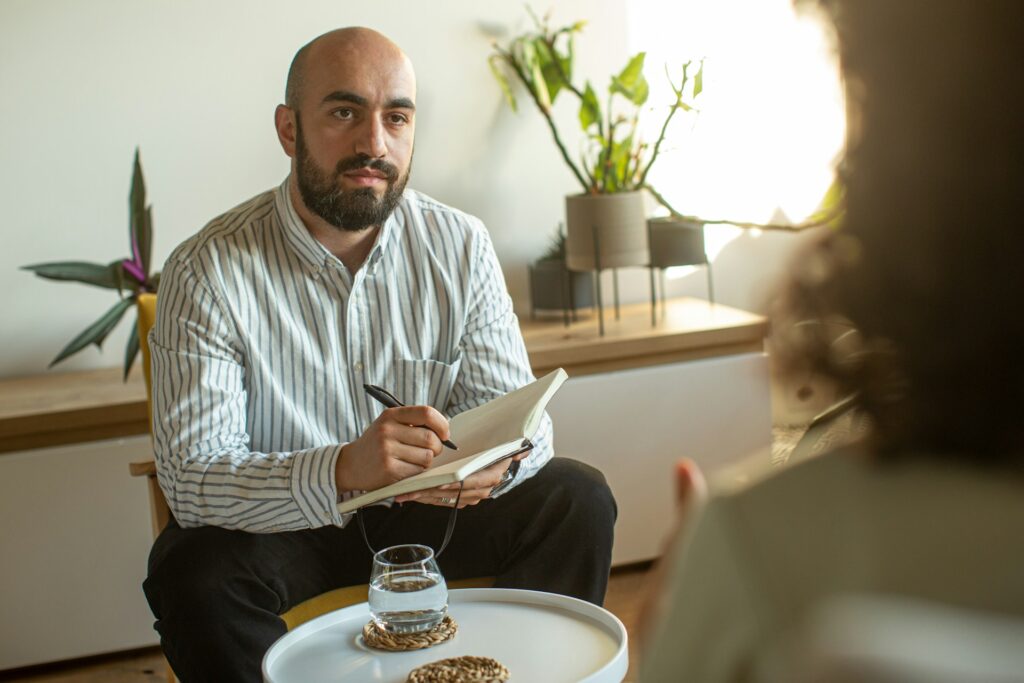Therapy can feel like a mystery before you start, and that can be intimidating.

It’s not unusual to walk in with a few assumptions, especially since most of us pick up images from TV shows or social media. You might picture dramatic breakthroughs, tearful confessions, a therapist who sits silently with a clipboard, or a weekly lecture full of perfectly packaged advice. That being said, the reality of therapy is often quieter, more human, and far more collaborative than the stereotypes suggest.
In fact, some of the things people expect to happen are exactly the things that won’t. That’s not a failure of the process—it’s what makes it work. Therapy creates a space where healing can unfold at your pace, in your way, without pressure or performance. And often, what’s most comforting is what’s missing. Here are some things you won’t find in therapy, and why their absence is actually part of what makes the experience safe, honest, and life-changing.
You won’t be judged.

Therapists are trained to hold space without judgement. That doesn’t just mean they’re neutral. It means they’re deeply invested in creating an environment where you feel safe enough to bring your messiest thoughts, your worst moments, and your real self. You don’t have to justify your feelings, clean up your language, or explain why something matters to you. You just have to show up. And for many people, that’s the first time they’ve had a space where they can do that without fear of being criticised or misunderstood.
You won’t be forced to talk about anything before you’re ready.

Therapy isn’t about being pushed into pain. If you’re not ready to talk about something, that’s respected. You can spend weeks just building trust or focusing on day-to-day issues. Good therapy meets you where you are. It allows space for silence, hesitation, uncertainty, and those are all valid parts of the process. You don’t have to be “ready” in the usual sense. You just have to be willing to show up.
You won’t be told what to do.

A therapist isn’t there to hand out instructions or solutions. Their role is to help you explore your own thoughts and patterns—to get curious, not controlling. They might offer gentle suggestions, but they’re not going to give you a checklist or a life plan. That can be frustrating at first, especially if you’re used to advice or quick fixes. But over time, it builds confidence. It reminds you that you’re capable of making your own choices, and that’s a much more powerful outcome than being told what to do.
You won’t have to perform.

You don’t need to be polite, eloquent, or emotionally tidy. You can cry, swear, sit in silence, ramble, contradict yourself, or say “I don’t know” ten times in a row. You don’t need to make it interesting or coherent. There are very few places in life where you can drop the performance completely. Therapy should be one of them.
You won’t be analysed like a puzzle to be solved.

Therapy isn’t about dissecting you or assigning a label. It’s not an exam. It’s not a mystery that needs unravelling. It’s a process of understanding, not diagnosing for the sake of it, but exploring what you’ve lived through, how you’ve adapted, and what’s showing up in your life now. You’re not broken, and you’re not there to be fixed. You’re there to be supported.
You won’t get instant answers.

Therapy is often slower than people expect. Sometimes it’s confusing. Sometimes you feel worse before you feel better. That doesn’t mean it’s failing; it means you’re doing the work. Real growth doesn’t happen on a schedule. It often comes from sitting with questions, not rushing toward answers. And even when it’s uncomfortable, that kind of space can be incredibly healing.
You won’t be told your feelings are wrong.

There’s no such thing as the “wrong” reaction in therapy. You can bring in anger, numbness, grief, fear, jealousy—whatever you’re carrying. You don’t have to justify it. You don’t have to make it neat. Your feelings are treated as valid data, not character flaws. A good therapist won’t try to cheer you up or push you to reframe something before you’re ready. They’ll sit with you in it, and that changes everything.
You won’t be expected to be ‘better’ every week.

Progress isn’t a straight line. Some weeks you’ll feel clear. Some weeks you’ll feel like you’re going backwards. That’s not failure. That’s being human. Therapy doesn’t ask you to arrive each week with an update or a win. It asks you to show up as you are—tired, frustrated, stuck, hopeful, or anywhere in between.
You won’t be compared to anyone else.

There’s no benchmark in therapy. No silent competition. No hidden timeline to hit. You’re not behind. You’re not doing it wrong. The work is yours, and it unfolds in the way that suits you. If your healing looks slower, messier, or different than someone else’s, that’s okay. It’s not about being impressive. It’s about being honest.
You won’t be handed a diagnosis you didn’t agree to explore.

If diagnosis is part of your therapy, it’ll be a conversation, not a surprise. Some therapists don’t diagnose at all; others will only bring it in if it feels relevant to your goals. Therapy isn’t just for people with a label. It’s for anyone who wants support. And if naming something helps you, great. But if it doesn’t, you won’t be forced to carry a diagnosis you’re not comfortable with.
You won’t be expected to ‘fix’ everything.

Therapy isn’t a repair job. You don’t need to come in with a clear goal or a list of things to change. Sometimes therapy starts with a vague sense of discomfort or a question you can’t quite name. That’s valid. You’re allowed to show up messy and uncertain. The goal isn’t to fix yourself; it’s to understand yourself.
You won’t be rushed to forgive or reframe things before you’re ready.

There’s a lot of pressure in life to see the positive. To find meaning in pain. To forgive, move on, or grow from it. But therapy doesn’t demand that of you. If something hurt you, that hurt matters. You don’t have to make it inspirational. You just have to feel it, and trust that you don’t have to do that alone.
You won’t be doing it alone.

Therapy doesn’t erase your problems. But it does mean you don’t have to carry them on your own. A therapist sits with you in the mess. They don’t fix it for you, but they help you face it, and that can be enough to make everything feel a little more manageable. Sometimes just having someone witness your pain, your confusion, or your truth is more healing than any advice could be.
So much of what makes therapy work is what it doesn’t ask of you.

It doesn’t ask you to be perfect, or quick, or even clear. It just asks you to be real. And that’s where the change begins, not with a breakthrough moment, but with the quiet, brave act of turning up exactly as you are.


